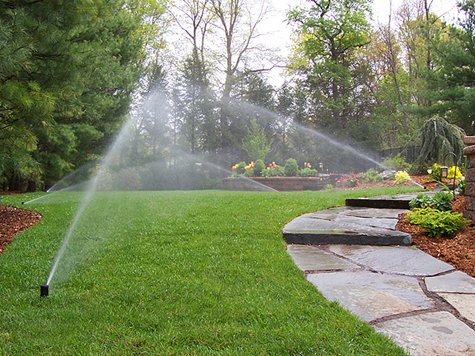TRENDS

Conservation Through Irrigation
Fullers Landscaping
Fuller's Landscaping is a company dedicated to serving all of the towns on Martha’s Vineyard using environmentally conscious products. In conjunction with these eco-friendly practices, Jesse Fuller has projected several ideas for water conservation in regards to irrigation.
“The main thing behind water conservation in irrigation is the design of the system and making sure water only goes exactly where it is needed and you are not over watering or under watering areas or over spraying outside the intended area,” Jesse explains. There are two landscaping tools that help to control this: drip emitters and weather sensors.
Drip emitters, also known as drip lines, can be used in replace of a traditional soaker hose. The result is that “these water at a much slower rate,” says Jesse. This is important because it “allows water to be absorbed into the soil evenly with less runoff.” The emitters come in different sizes, releasing one gallon of water per hour or more based on the size of the plants. Additionally, they can be placed directly at the base of the plants so that water isn’t wasted on unplanted spaces. These features give customers the ability to customize their system, whereas with traditional soaker hoses, “if you had large trees in the same planting area as small bushes and flowers in order to water the large plants enough you would end up over watering the small plants,” says Jesse.
When it comes to weather sensors, the features range from simple to more complex. “The most simple and effective is a rain sensor,” Jesse explains. The function is that is shuts off the irrigation system when it is raining out. “More complicated sensors measure for wind, solar output, and temperature.” The particularly advanced sensors have controls for water based on the slope of the area, the type of soil or plant, and location.
Jesse mentions other small things that can be done to improve water conservation. “Better quality sprinklers and connections also make a big difference. Lower quality components are prone to leaks which waste water,” he notes. Furthermore, there are certain sprinklers that create multiple fine jets as suppose to a mist. “A mist will evaporate more quickly in the air,” thus it is wasting less water.
The bottom line is that “water conservation in irrigation is addressed in many ways from the simple to the complicated,” Jesse says. It can be as simple as “proper placement of sprinkler heads and adjusting them so they are not watering your patio, driveway, or woods.” Any adjustment that can be made, no matter how minor, helps both water conservation and your plants.
For more information on the Fullers Companies go to www.fullerscompany.com
“The main thing behind water conservation in irrigation is the design of the system and making sure water only goes exactly where it is needed and you are not over watering or under watering areas or over spraying outside the intended area,” Jesse explains. There are two landscaping tools that help to control this: drip emitters and weather sensors.
Drip emitters, also known as drip lines, can be used in replace of a traditional soaker hose. The result is that “these water at a much slower rate,” says Jesse. This is important because it “allows water to be absorbed into the soil evenly with less runoff.” The emitters come in different sizes, releasing one gallon of water per hour or more based on the size of the plants. Additionally, they can be placed directly at the base of the plants so that water isn’t wasted on unplanted spaces. These features give customers the ability to customize their system, whereas with traditional soaker hoses, “if you had large trees in the same planting area as small bushes and flowers in order to water the large plants enough you would end up over watering the small plants,” says Jesse.
When it comes to weather sensors, the features range from simple to more complex. “The most simple and effective is a rain sensor,” Jesse explains. The function is that is shuts off the irrigation system when it is raining out. “More complicated sensors measure for wind, solar output, and temperature.” The particularly advanced sensors have controls for water based on the slope of the area, the type of soil or plant, and location.
Jesse mentions other small things that can be done to improve water conservation. “Better quality sprinklers and connections also make a big difference. Lower quality components are prone to leaks which waste water,” he notes. Furthermore, there are certain sprinklers that create multiple fine jets as suppose to a mist. “A mist will evaporate more quickly in the air,” thus it is wasting less water.
The bottom line is that “water conservation in irrigation is addressed in many ways from the simple to the complicated,” Jesse says. It can be as simple as “proper placement of sprinkler heads and adjusting them so they are not watering your patio, driveway, or woods.” Any adjustment that can be made, no matter how minor, helps both water conservation and your plants.
For more information on the Fullers Companies go to www.fullerscompany.com









